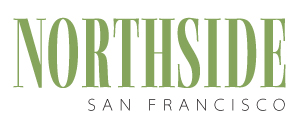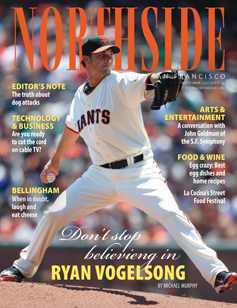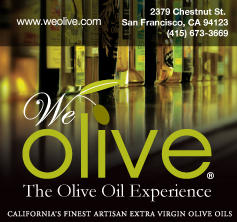
KQED's John Boland
photo: Cristiana Ceppas
photo: Cristiana Ceppas
Assuming the position at KQED is a coming home for Boland. He first worked there in 1995 where, as publisher, he led the effort to turn around the finances at San Francisco Focus magazine. Later, Boland was instrumental in getting KQED to quickly adjust to the digital age. He arranged a five-channel agreement with cable TV operators.
We spoke with him at the KQED studios.
What is a content officer?
It’s a new title that originally came from Silicon Valley. It acknowledges the multimedia aspect of everything. My role was to bring together five different operating divisions of PBS online and have them work together more.
How are the changes in newspapers affecting broadcasting?
It makes our role more important. Because newspapers are cutting back, particularly larger newspapers – a lot of smaller papers are surviving. We pulled together online to create a single newsroom from KQED and KQED Radio. We added eight positions, [and] we added twelve or thirteen additional newscasts on KQED Radio. We continue to ramp up, particularly in arts, science and news.
What is your prognosis for the Congressional efforts to defund NPR?
I’m always optimistic. If I had to make a prognosis, I’d say that Congress will be influenced by their constituents, as it should be. We know that 170 million Americans every week use public radio or television. Many of them are contacting their representatives, saying, “We appreciate this service. It needs some government support.” It’s not a lot now – in the case of KQED, it’s eight or nine percent. It’s a very important cornerstone of the funding. KQED would lose five million dollars a year. There are smaller stations that could not survive. I do think that in the Senate, and in the White House, cooler heads will prevail.
What do you like best about San Francisco?
I had almost a physical reaction when I first came to San Francisco in 1980 or ’79. Something just clicked about the environment, the culture, the weather, and I thought, I think this is where I belong.
Did you have heroes when you were growing up?
Well, interestingly, Bill Moyers was one of my heroes. Then I had the opportunity to actually work with him at PBS and become friendly with him at KQED. I think my hero in my young newspaper days was Jimmy Breslin. He gave a seminar when I was starting off in journalism. He talked about how important it was to poke the powerful. In other words, if you’re not angering anyone, you’re not doing your job.
Are there real provocateurs like Breslin still around these days?
Oh, we get some people like that, particularly on Michael Krasny’s show, and the guests, and the kind of thinking like that. We get it on NPR as well. I don’t know if we really have any Jimmy Breslin-types anymore.
What do you like to do when you’re not at KQED?
Well, I swim. I swim with the Masters team at the University of San Francisco. I do that every morning. That’s a good Zen sort of process. Years ago, we bought an old, broken-down apple farm in Sebastopol, the area where we used to have a newspaper. So I’m there a lot of times on the weekends. Being a farmer – and it is an active, commercial apple farm – is a very good counter-balance to being the head of KQED.
What do you like to read?
I like novels, but I tend to end up reading a lot of things about the media. I just finished Philip Roth’s latest novel [Nemesis]. I love reading his books because they’re about Newark [New Jersey], where I was born, and I can sort of recognize my grandfather, and things like that. It’s about the polio epidemic during World War II.
I’m also reading the biography of Isias Hellman, Towers of Gold, which is basically a wonderful California history book. It tells the story of Warren Hellman’s ancestor, Isias, who came from Bavaria, [and was] one of the founding fathers of Los Angeles, Wells Fargo bank, UC Berkeley, the University of Southern California. It’s a fascinating story to me that I never knew. I never knew the incredible role that this small group of families [played] from basically the same village in Bavaria– the Haases, the Hellmans, the Lilienthals, a lot of names of Jewish families. Levi Strauss came from the same area, the Sterns, too.
Does California still hold promise, even now?
I think so. We’re going through an incredibly difficult time, what we’re confronting with the state budget. I think we’re dealing with it before a lot of other states that are right behind us. I was at the Commonwealth Club last night. There were a lot of people who are very smart, very successful, and very committed to the state. I think that somehow we’ll figure it out.
E-mail: bruce@northsidesf.com








